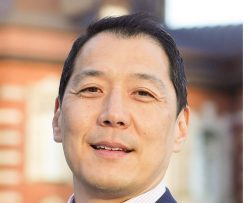10:20 JST, January 3, 2022
Recently, I received some unsolicited advice from an elderly relative, who I’ll call Granny Opine, that was inappropriate in about all ways that such unrequested suggestions can be. I had mentioned that I was further culling my collection of Japanese calligraphy works produced by my daughter Mary, mostly when she was in elementary school and junior high. My problem, like many would-be winnowers, was that I simply couldn’t decide what to hang on to and what to discard. Works that made it to the “abandon” pile later caught my eye and migrated back to “keep.”
In telling Granny Opine about it I was not seeking recommendations for ways to become a more merciless declutterer. It was just something to say, but — “What Mary should do,” Granny Opine cut in, already alerting me to advice on the way through the use of “should” and that such counsel would be off base, given the switch of subject from me to my daughter.
“What Mary should do is call the American Embassy and let them know that she can work freelance for them as a calligrapher, writing out pretty invitations,” Granny Opine said.
The unsuitability of this advice was profound: 1) Mary has a full-time job that keeps her quite busy and is definitely not looking around for a side gig; 2) She has not practiced Japanese calligraphy for many years; 3) If she was to pursue a way to make some money off her skill, why would she contact the embassy about it?; 4) This proposed action would in no way resolve my small issue of dealing with her childhood creations.
Nevertheless, Granny Opine meant well, and I gulped back any snarky responses, merely acknowledging that that was one possible plan of action, though unlikely at the moment. What I noticed most was that it had been a very long time since I had gotten any vigorously proposed advice from anyone, and my conversation with Granny Opine prompted me to take another look at some research undertaken by Phillip Morrow, a discourse analyst, on online advice-giving in Japan.
Morrow analyzed 53 pieces of advice given in response to 26 problem messages on a peer-advice site for those contemplating divorce. Morrow’s study sheds light on several facets of the here’s-what-to-do dynamic in Japan.
Using the classification system of another researcher of advice-giving, Miriam Locher, Morrow categorized the advice in terms of 13 types of discursive moves, including all of the kinds of things people might do when giving advice, like sharing their own experience or asking for more information, in addition to greeting and closing the advice.
Morrow found that one central feature of the advice-bestowing comments was the crafting of an assessment component, which usually made an appearance before the main advice section. Assessments were by far the most prevalent move, amounting to 41% of the total 339 moves, followed by the advice itself, which comprised 24% of the moves. In the assessment segment, the peer advisers basically gave their take on the situation that the advice-seeker had described — “It seems you are suffering from panic disorder” — as a preface to venturing a recommendation.
In contrast, Morrow notes that in a study conducted by Locher of advice provided in an American Internet health column, assessments amounted to only 20% of the moves, and the core advice represented 49%, a near-reversal of the frequencies. Morrow acknowledges that advice provided by a peer is naturally different from that supplied by a medical authority. Nevertheless, the disparity in the frequency of assessment moves is striking and suggests that the Japanese advice-givers felt it best to indicate their construal of events before saying what the person with the marital problem should do.
Morrow found other distinctive features of the Japanese advice as well. The advice often used the first-person volitional form, corresponding to “let’s,” conveying the sense that the advice-giver was a coach, invested in the outcome, with statements like, “Let’s be strong.” Similarly, the advice made frequent use of interactional particles, like “ne,” which typically translates as a tag question, as in, “Because you give priority to emotion, it is a difficult problem, isn’t it?” This, too, positions the advice-giver alongside the guidance-requester, together on Team Let’s-Figure-It-Out.
Additionally, references to the social role of the advice-seekers were common, sometimes calling them by their familial designation, like, “Hang in there, Mom” or advocating a distinction between the individual’s personal feelings and their societal responsibility. For example, writing “as a wife” in quotation marks before recommending that the advice-seeker continue to care for a dying husband despite his infidelity. Rather than being free agents, those considering divorce were viewed as embedded in a communal network and advised to think about what they should do logically in this context.
Morrow’s findings correspond well to the type of advice I’ve heard on Japanese radio and watched on TV shows. In truth, for many years I found this mode of friendly counsel sometimes oddly patronizing and distancing, despite the apparent empathy. It sometimes seemed as if the person in the predicament were the problem to be solved, rather than the actual issue at hand.
Over time, though, I’ve become used to it, and reflecting on Granny Opine’s boldly skewed advice made me realize more acutely how attuned many Japanese people are to situational specifics and committed to steering the advice-seeker in the right direction. I can well imagine someone telling me, “Isn’t she trying to be helpful? (Assessment) As a ‘younger relative’ let’s try to accept her words in the constructive spirit intended.”
OK by me: I accede to both the content and form of the expected suggestion.
Top Articles in Editorial & Columns
-

Riku-Ryu Pair Wins Gold Medal: Their Strong Bond Leads to Major Comeback Victory
-

40 Million Foreign Visitors to Japan: Urgent Measures Should Be Implemented to Tackle Overtourism
-

China Provoked Takaichi into Risky Move of Dissolving House of Representatives, But It’s a Gamble She Just Might Win
-

University of Tokyo Professor Arrested: Serious Lack of Ethical Sense, Failure of Institutional Governance
-

Policy Measures on Foreign Nationals: How Should Stricter Regulations and Coexistence Be Balanced?
JN ACCESS RANKING
-

Japan PM Takaichi’s Cabinet Resigns en Masse
-

Japan Institute to Use Domestic Commercial Optical Lattice Clock to Set Japan Standard Time
-

Israeli Ambassador to Japan Speaks about Japan’s Role in the Reconstruction of Gaza
-

Man Infected with Measles Reportedly Dined at Restaurant in Tokyo Station
-

Videos Plagiarized, Reposted with False Subtitles Claiming ‘Ryukyu Belongs to China’; Anti-China False Information Also Posted in Japan























